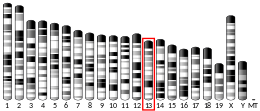Protocadherin-24 is a protein that in humans is encoded by the PCDH24 gene.[5][6][7]
Interactions
editReferences
edit- ^ a b c GRCh38: Ensembl release 89: ENSG00000074276 – Ensembl, May 2017
- ^ a b c GRCm38: Ensembl release 89: ENSMUSG00000034918 – Ensembl, May 2017
- ^ "Human PubMed Reference:". National Center for Biotechnology Information, U.S. National Library of Medicine.
- ^ "Mouse PubMed Reference:". National Center for Biotechnology Information, U.S. National Library of Medicine.
- ^ Suzuki ST (Dec 2000). "Recent progress in protocadherin research". Exp Cell Res. 261 (1): 13–8. doi:10.1006/excr.2000.5039. PMID 11082270.
- ^ a b Okazaki N, Takahashi N, Kojima S, Masuho Y, Koga H (Jul 2002). "Protocadherin LKC, a new candidate for a tumor suppressor of colon and liver cancers, its association with contact inhibition of cell proliferation". Carcinogenesis. 23 (7): 1139–48. doi:10.1093/carcin/23.7.1139. PMID 12117771.
- ^ "Entrez Gene: PCLKC protocadherin LKC".
Further reading
edit- Yang LY, Wang W, Peng JX, et al. (2005). "Differentially expressed genes between solitary large hepatocellular carcinoma and nodular hepatocellular carcinoma". World J. Gastroenterol. 10 (24): 3569–73. doi:10.3748/wjg.v10.i24.3569. PMC 4611994. PMID 15534908.
- Ota T, Suzuki Y, Nishikawa T, et al. (2004). "Complete sequencing and characterization of 21,243 full-length human cDNAs". Nat. Genet. 36 (1): 40–5. doi:10.1038/ng1285. PMID 14702039.
- Strausberg RL, Feingold EA, Grouse LH, et al. (2003). "Generation and initial analysis of more than 15,000 full-length human and mouse cDNA sequences". Proc. Natl. Acad. Sci. U.S.A. 99 (26): 16899–903. Bibcode:2002PNAS...9916899M. doi:10.1073/pnas.242603899. PMC 139241. PMID 12477932.
- Suzuki Y, Yoshitomo-Nakagawa K, Maruyama K, et al. (1997). "Construction and characterization of a full length-enriched and a 5'-end-enriched cDNA library". Gene. 200 (1–2): 149–56. doi:10.1016/S0378-1119(97)00411-3. PMID 9373149.
- Hillier LD, Lennon G, Becker M, et al. (1997). "Generation and analysis of 280,000 human expressed sequence tags". Genome Res. 6 (9): 807–28. doi:10.1101/gr.6.9.807. PMID 8889549.
- Maruyama K, Sugano S (1994). "Oligo-capping: a simple method to replace the cap structure of eukaryotic mRNAs with oligoribonucleotides". Gene. 138 (1–2): 171–4. doi:10.1016/0378-1119(94)90802-8. PMID 8125298.




